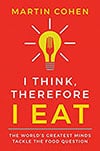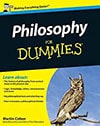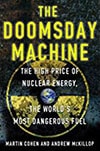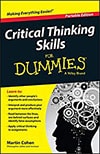Martin Cohen, PhD, author of many nonfiction books including Philosophy for Dummies, The Doomsday Machine, I Think Therefore I Eat, 101 Philosophy Problems, and 101 Ethical Dilemmas, which despite being originally aimed at the academic market, has sold over 250,000 copies and been translated into 20 different languages, provided this review of former literary agent Mark Malatesta. Martin worked with Mark to improve his manuscript, pitch materials, and platform resulting in representation with a very established literary agency. Scroll below to learn more. Click here to see all Mark Malatesta reviews. And click here to learn more about Literary Agent Undercover and The Bestselling Author after you read the review about Mark Malatesta below by Martin.
Mark Malatesta Review by Martin Cohen, PhD
 Things have been moving fast here and I finally made it. I got a top agent with Trident Media Group, and it took less than six weeks after that to get a book deal.
Things have been moving fast here and I finally made it. I got a top agent with Trident Media Group, and it took less than six weeks after that to get a book deal.
Before I contacted you, I’d done various versions of my book, and one version had been shown to UK publishers by a UK agent. It was met with a dusty response. I had worked carefully on the book for a year, maybe two years. It was annoying and I felt quite let down. But, on the other hand, I felt the book’s potential hadn’t been exhausted.
So, when I contacted you, I had a project which I’d put a lot of work into, but I knew more could be done to improve it. Part of what was very helpful to me during our time together were your comments about the actual manuscript, which I substantially changed after we talked. The book has a completely different feel to it now.
 The manuscript changed from being very episodic to more of a connected whole. That was crucial. We also shifted the book to have more of an emphasis on my expertise as a philosopher and social scientist, instead of a nutritionist. We used that as a frame, instead, and put everything in that voice, since I’m a PhD, not an MD.
The manuscript changed from being very episodic to more of a connected whole. That was crucial. We also shifted the book to have more of an emphasis on my expertise as a philosopher and social scientist, instead of a nutritionist. We used that as a frame, instead, and put everything in that voice, since I’m a PhD, not an MD.
That was a misstep that caused me to stumble. I ended up writing a book that wasn’t the best fit for me, and I wasn’t the right person to promote that book. That shift in perspective caused me to do a line by line edit of the manuscript. Not a total rewrite, but I changed about twenty percent. I went through the manuscript carefully, several times.
I’ve published books previously and I’ve worked directly with agents and publishers. I now realize, that, before I worked with you, I was creating outlines, book proposals, and marketing analyses in a superficial way. I didn’t know better. You steered me in a better direction. With the wrong influence, authors can make their books worse.
 You helped me realize the point of an outline and proposal is to introduce and “sell” a project from the point of view of an agent and publisher. That’s what’s needed. It’s a completely different perspective, and although in a sense it should have been obvious, at the time it was an eye-opener for me.It took me fifteen years working in the business to finally see, “Oh, that’s how I should be doing it.”
You helped me realize the point of an outline and proposal is to introduce and “sell” a project from the point of view of an agent and publisher. That’s what’s needed. It’s a completely different perspective, and although in a sense it should have been obvious, at the time it was an eye-opener for me.It took me fifteen years working in the business to finally see, “Oh, that’s how I should be doing it.”
For example, I had scarcely thought about author platform. My most successful book, the first book to treat philosophy as a fun set of riddles, was really successful somewhat by accident. I didn’t realize the book required me to be a philosopher. I was oblivious to that, because I was just thinking about writing a fun book. That’s all that mattered to me.
What you most successfully managed to do was to alert me to the PUBLISHER’S perspective, which has very little to do with the content of books that are so dear to us authors, and much to do with locating them in the market. It’s really a kind of Copernican Shift, as philosophers might say: the book revolves around the market, not around the author’s research or interests.
 When I moved on to other books about other subjects, I dimly realized you have to persuade people that you’re knowledgeable about those areas. You can write about topics in articles—in a journalistic or experiential way. People will accept that, but they don’t want to buy and read a book where the person doesn’t have deep knowledge about the topic.
When I moved on to other books about other subjects, I dimly realized you have to persuade people that you’re knowledgeable about those areas. You can write about topics in articles—in a journalistic or experiential way. People will accept that, but they don’t want to buy and read a book where the person doesn’t have deep knowledge about the topic.
Having those epiphanies during our process together caused the various parts of my book proposal to improve and fall into place—despite having done so many proposals in the past. That training, to me, even if I hadn’t gotten an agent for the book I worked on with you, would have been worth more than the fee I paid, which was very substantial.
When I started writing books, many years ago, it seemed much easier to persuade publishers. In a way, I’m a bit surprised. But now I’ve learned to psych myself up to do a proposal and get into it, so it becomes interesting. Not just for agents and publishers, but for me. It’s quite hard because that doesn’t come naturally. I’ve never been good at selling myself.
 I liked my phone calls with you, too. They were very motivating. I’m sure you’ve heard this before, but being an author is quite lonely. Authors are typically quite reclusive, but talking to someone who’s interested in your project is helpful. So, the personal contact we’ve had has been a very important part of our work together.
I liked my phone calls with you, too. They were very motivating. I’m sure you’ve heard this before, but being an author is quite lonely. Authors are typically quite reclusive, but talking to someone who’s interested in your project is helpful. So, the personal contact we’ve had has been a very important part of our work together.
Sending out the query letters, as I expect other people have said, is quite a grind. But, on the other hand, having done things on my own, I appreciated the power of having a proven system to follow for that. So, though I didn’t like doing it, in a way, I was still positive about it, because your system takes an impossible task and breaks it down.
You’re a very structured person and the way you’ve modularized everything—made the complicated process of developing book projects, researching agents, and pitching them—is incredibly powerful. My partner is an artist, and she was terribly enthusiastic about me working with you as well. She latched on immediately to what our work together might lead to.
She intuitively saw that if you want to be an artist or anything else, you have to train yourself a little bit. You might have to put some money into that process, too, and do some things that will get you further. Authors, perhaps, are a little bit reluctant to do that. We often think all you need is some paper or something to type with.
There’s a bit of a myth that you shouldn’t need any training. You should just be able to write and sell well, off the top of your head. There’s this lingering belief amongst writers that they don’t really need anyone else. It’s convenient and simpler to think that way, but it’s also shortsighted and inaccurate.
Your writing, your pitch materials, and your platform can all get better if you let other people contribute. Most authors, like me, don’t have a big income. But, nonetheless, they should see the value of the training you provide, whether they get a deal or not. I am quite happy, and it’s been really nice working with you.
Cheers…
Author of many nonfiction books including Philosophy for Dummies, The Doomsday Machine, I Think Therefore I Eat, 101 Philosophy Problems, and 101 Ethical Dilemmas, which despite being originally aimed at the academic market, has sold over 250,000 copies and been translated into 20 different languages
* * *
Do You Want to Be Like Martin Cohen, PhD Who Provided this Review About Mark Malatesta?
Do you want to be like Martin and get represented by a top literary agency like Trident Media Group? Click here to get instant access to the Free Resources on our websites for authors and click here to find out how you can Schedule an Introductory Coaching Call. Mark Malatesta is founder of The Bestselling Author and Literary Agent Undercover, helping authors of all genres (fiction, nonfiction, and children’s books) get top literary agents, publishers, and book deals. The above review of Mark Malatesta, Author Coach was provided by author Martin Cohen, PhD.


